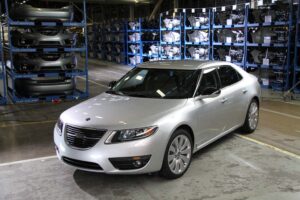Claims maker blocked deals that would have saved Saab.
by G.fawumi 07, 2012

GM effectively forced Saab to liquidate when it refused to sell intellectual property for vehicles like the 9-5 sedan to a new owner.
General Motors is facing a $3 billion lawsuit filed by the small Dutch sports car manufacturer Spyker Cars NV – which claims the U.S. maker improperly blocked its efforts to save Sweden’s now-bankrupt Saab Automobile.
Spyker purchased Saab in early 2010 from General Motors after the American carmaker decided to sell or shutter the struggling Swedish company. But it quickly became apparent that Spyker didn’t have the cash needed to see the venture through. It made a series of attempts to save or sell Saab, but was forced to liquidate the firm last year.
Spyker – which briefly changed its name to Swedish Cars, says GM blocked its rescue effort to avoid the possibility of facing additional competition in China – where General Motors is the largest manufacturer.
“We tirelessly worked to save Saab Automobile until GM destroyed those efforts and deliberately drove Saab Automobile into bankruptcy,” says Spyker CEO Victor Muller. The Dutch entrepreneur insists, “We owe it to our stakeholders and ourselves that justice is done.”
For its part, General Motors is dismissing Spyker’s allegations, spokesman Dave Roman telling TheDetroit Bureau.com, “We have reviewed the complaint, and it is completely without merit. We will vigorously defend the company against these baseless allegations.”
GM took a controlling stake in the endlessly struggling Saab in 1998 and bought the remaining shares a decade later. But despite pumping billions into the brand it continued to flounder. Following its emergence from Chapter 11 bankruptcy protection in 2009 GM decided to close or sell off four brands. Saab was the only one that eventually found an owner.
Just barely. GM was already starting to shut down the Swedish company when Spyker came up with a $74 million bid that kept Saab in operation. But it took longer than expected to re-open the maker’s home plant in Trollhattan, Sweden and sales of the new 9-5 sedan launched far slower than expected as a result.
By early 2011 Saab was effectively out of cash and in March suppliers boycotted the firm. Except for a brief run of barely a week, the Trollhattan plant would stay shut.
Muller and his team frantically began searching for a white knight and a serious of offers came in from various Chinese automakers and auto retailers, but they quickly ran into a series of roadblocks. For one thing, the European Investment Bank, which helped finance the Saab purchase, dragged its heels.
More troublesome, after expressing initial willingness to help GM suddenly reversed course and said it would not permit Saab to share its intellectual property with a new partner.
Exactly why has been a matter of debate, though it is widely suspected that GM and its own Chinese partners did not want to see another player enter that booming market. Unable to produce the 9-5 and other key products Saab had little to offer a buyer.
The firm was forced into a Swedish version of bankruptcy protection and then, by the end of 2011, Swedish Automobile had to liquidate the firm, writing off its investment – later changing its name back to Spyker.
The Spyker lawsuit was filed in the U.S. District Court of the Eastern District of Michigan and alleges GM unfairly interfered with its effort to sell Saab to a Chinese company.
Ironically, after Spyker pulled out, Swedish bankruptcy court overseers were able to sell the remaining Saab assets to a Chinese/Japanese consortium named National Electric Vehicle Sweden. It is expected to use a new platform Saab was developing when it failed as a basis for a new line of electric vehicles that could be sold in China and possibly other parts of the world.
“Since Saab Automobile is in receivership,” Muller said in a statement, “Spyker and Saab have entered an agreement pursuant to which Spyker will bear the costs of such litigation in exchange for a very substantial share of Saab Automobile award when the proceedings are successful,”
Spyker insisted it is ready “to see the lawsuit through to the end.”



No comments:
Post a Comment